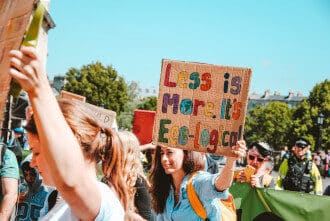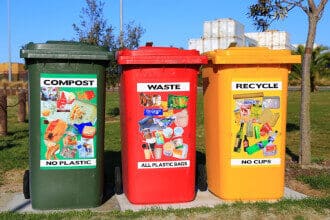By Sarah Kudishecich – Anyone who reads the news today is exposed to alarming articles about climate change and environmental degradation. Most recently, a study found micro-plastics for the first time in human blood. The average adult actually consumes a credit card worth of plastic every week.
Rather than getting overwhelmed by all the negative news, we can take action by changing our own relationship to waste and reducing the amount of trash that we produce.
The Zero Waste Movement
A growing number of individuals have been pursuing a zero waste lifestyle, where they attempt to send zero waste to a landfill or incinerator. The zero waste movement has grown to hundreds of thousands of people around the world who attempt to reduce their waste as much as possible.
While reducing your waste to nothing may sound daunting, it is important to remember that the effort matters more than the outcome. Each time we take a step to reduce waste, we also influence those around us to become more conscious about our impact on the planet. A zero waste lifestyle is less about being perfect, and more about every individual action we take.
A Zero Waste Life
If you are interested in exploring the possibilities of zero waste living, you can consider following a three phased process:
1. Awareness
The most important part in starting a zero waste lifestyle is to increase awareness. Start by reflecting on what types of waste you produce today. Is it plastic packaging? Food waste? Plastic bags? Paper towels? Water bottles?
When we start to become aware of our waste, we can also start becoming aware of how to reduce it and what the alternatives are. Often as we start to become aware of our waste, we may influence others to become of their waste as well.
2. Action
The zero waste lifestyle was started by people like you who wanted to take action and change their habits around how they engage with the environment around them.
There are many things that you can consider doing when it comes to taking action. Several of these are so simple, that you could make a change even this week!
- Consider taking your food scraps to a local compost bin.
- Bring reusable bags when you go to grocery stores
- Opt for reusable bottles instead of disposable plastic bottles
- Choose bar soap over body wash from a plastic bottle
- Reuse things that you already have instead of buying new
- Shop in the bulk section using your own containers
It’s important to remember that a zero waste home doesn’t happen overnight, but with small changes we can make a big difference in our personal lives and in our communities.
3. Education
Most importantly, educate the individuals and businesses that you engage with. Consider writing a letter to your local government requesting city-wide compost options. Educate your friends and family on social media about the changes you are making and what they can do. Start a petition to a local business about reducing their plastic packaging.
Benefits of a Zero Waste Lifestyle
In addition to reducing your personal consumption of single use plastic, there are many other benefits of low waste living.
1. Saving Money
In her book, The Zero Waste Workbook, Sarah Kudishevich demonstrates that the average family could save up to $4,000 every year, simply by going zero waste.
2. Sustainable Lifestyle
Another benefit is living in accordance with your values. Zero waste living is a practical way to live by the things you care about, and bring your values into your daily life.
3. Supporting Local Businesses
Zero waste living goes beyond the eco friendly swaps and considers all aspects of how we engage with the planet. By supporting the local economy, we reduce transportation emissions and support small businesses in our communities.
Influencing Large Scale Change
When consumers change, businesses also change. The zero waste movement has already influenced many companies to reduce their plastic packaging and opt for more eco friendly options.
The benefits of waste free living extend far beyond the impact to your personal life. By focusing on our personal waste habits, we can make a global impact.
Proper Disposal
One of the important components of building a zero waste home is to consider proper disposal of the items that come into your house. Here are some of the things to consider as it comes to disposal of waste:
- Choose to reuse. Rather than tossing something in the trash, see if there is another way to use it first.
- Get familiar with local recycling. Check to see what materials are currently being recycled as not all recyclable materials are in demand. Consider a tour at the local recycling facility or check online to see what is being accepted.
- Choose to compost instead of sending food waste to a landfill. When food scraps end up in the trash, they release potent greenhouse gasses that damage the environment. When we compost food waste, our trash is transformed into nutrients that nourish future growth.
By focusing on proper waste disposal, we take responsibility for the full lifecycle of items that we purchase and bring into our homes.
Waste Free Living and Religion
“When Eating Meat Was a Sacrifice” is an essay by Dr. Richard H. Schwartz, (adapted from content published on Canfei Nesharim and in Eco Bible).
Leviticus 6:2 – Command Aaron and his sons: This is the ritual of the burnt offering: The burnt offering itself shall remain where it is burned upon the altar all night until morning, while the fire on the altar is kept going on it.
When the Israelites were in the wilderness before they entered the Land of Israel, eating meat was associated with holiness. Every piece eaten came from an animal sacrificed in the Tabernacle, an act meant to bring the worshipper closer to God. The word korban, sacrifice, is related to le-karev, to come close. Through the sacrifice, worshippers felt that they were giving themselves vicariously to God. People owned animals as sources of labor or food as well as capital, so slaughtering them for God and burning them as a burnt offering was a sacrifice of a precious source of income and food. Other sacrifices were then eaten by the people who offered them.
Today, many people eat meat daily, and more than once a day, with little if any sense of sacrifice. While the Torah forbids inflicting unnecessary pain on animals, most farm animals, including those raised for kosher consumers, are now raised on “factory farms” in cramped, confined spaces, with many being drugged, mutilated, and denied fresh air, sunlight, and exercise.
Modern livestock agriculture also contributes substantially to global warming, soil erosion, air and water pollution, overuse of chemical fertilizers and pesticides, destruction of tropical rainforests and other habitats, and other environmental damage. Animal-based agriculture emits more greenhouse gases (26 percent in CO2 equivalents) than the entire transportation sector.
While the Torah mandates we not waste, or unnecessarily destroy, anything of value (see commentary in Eco Bible to Deuteronomy 20:19), animal agriculture wastes grain, land, water, energy, and other precious resources. More than half the world’s population will live in areas chronically short of water by the mid-21st century, yet animal-based human diets require up to 13 times as much water (to raise the animals) as diets free of animal products.
While the Torah stresses we are to assist the poor and share our bread with hungry people, about 70 percent of grain grown in the United States and more than 40 percent grown worldwide is fed to animals destined for slaughter. Grain-fed cattle are given corn and soy, and some are fed in concentrated animal feeding operations, known as feed lots. Meanwhile, more than seven million people worldwide die each year from malnutrition and its effects.
* Featured image source






